Professional and Discipline in Nursing: Person-Centred Care Essay
VerifiedAdded on 2023/02/01
|6
|2079
|63
Essay
AI Summary
This essay provides a comprehensive overview of person-centred care (PCC) in nursing, emphasizing its growing importance in modern healthcare. It defines PCC as an approach that prioritizes individual patient needs, wishes, and goals, highlighting the shift from diagnosis-focused care. The discussion explores the application of PCC across various patient scenarios, including those with mental illnesses, comorbidities, and suicidal ideations, emphasizing the need for nurses to adapt their approach and maintain ethical boundaries. The essay references the Nursing and Midwifery Board of Australia (NMBA) codes and principles, particularly those related to providing safe, effective, and collaborative care. It examines the role of informed consent, open disclosure, and patient autonomy in the delivery of PCC. Furthermore, the essay underscores the importance of nurses possessing specific skills and qualities to effectively implement PCC, advocating for a shift in perception from viewing patients as clients to partners in decision-making. The conclusion reinforces the value of PCC as a strategy for delivering high-quality and safe nursing services, supported by ethical and professional standards.
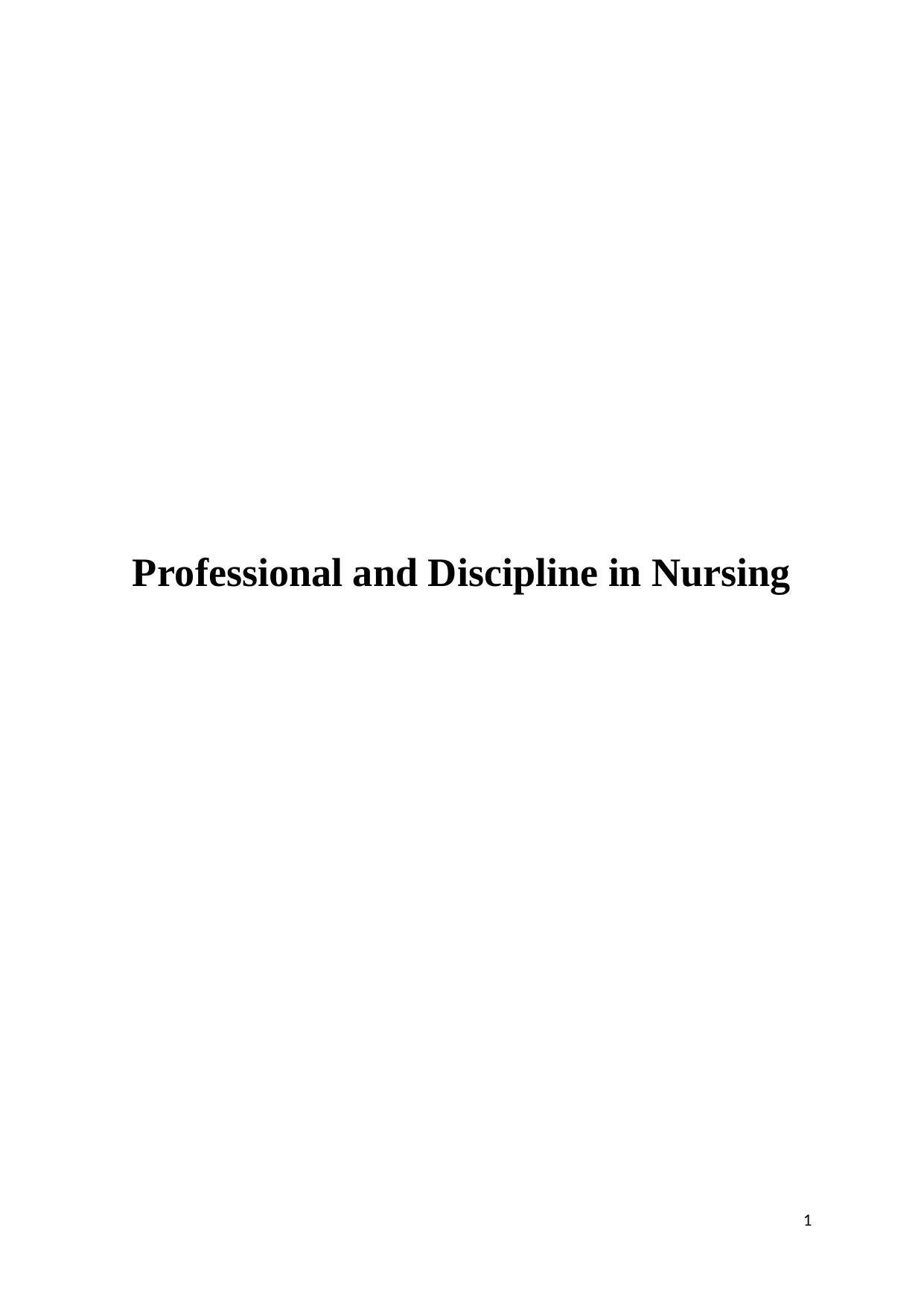
Professional and Discipline in Nursing
1
1
Paraphrase This Document
Need a fresh take? Get an instant paraphrase of this document with our AI Paraphraser
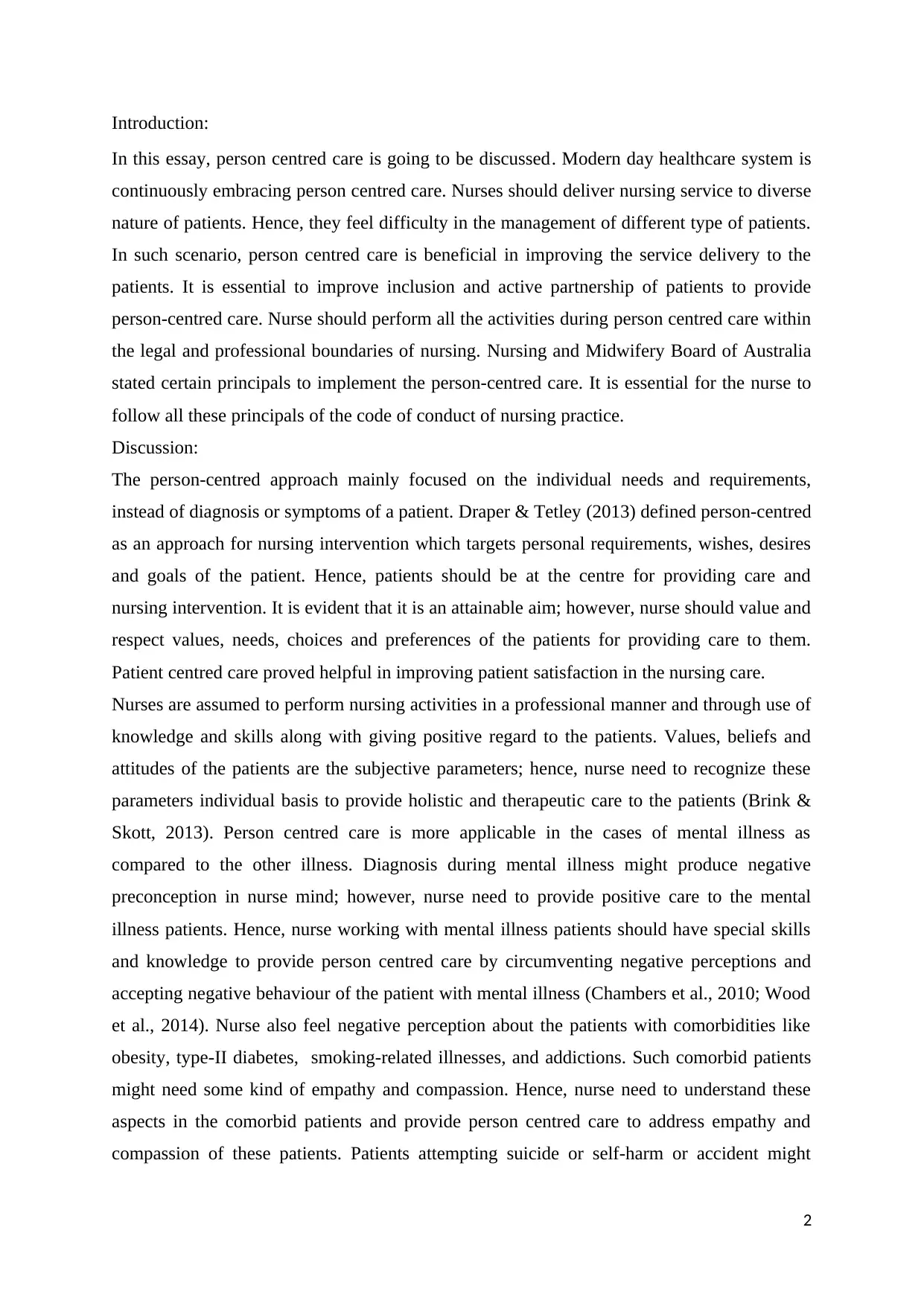
Introduction:
In this essay, person centred care is going to be discussed. Modern day healthcare system is
continuously embracing person centred care. Nurses should deliver nursing service to diverse
nature of patients. Hence, they feel difficulty in the management of different type of patients.
In such scenario, person centred care is beneficial in improving the service delivery to the
patients. It is essential to improve inclusion and active partnership of patients to provide
person-centred care. Nurse should perform all the activities during person centred care within
the legal and professional boundaries of nursing. Nursing and Midwifery Board of Australia
stated certain principals to implement the person-centred care. It is essential for the nurse to
follow all these principals of the code of conduct of nursing practice.
Discussion:
The person-centred approach mainly focused on the individual needs and requirements,
instead of diagnosis or symptoms of a patient. Draper & Tetley (2013) defined person-centred
as an approach for nursing intervention which targets personal requirements, wishes, desires
and goals of the patient. Hence, patients should be at the centre for providing care and
nursing intervention. It is evident that it is an attainable aim; however, nurse should value and
respect values, needs, choices and preferences of the patients for providing care to them.
Patient centred care proved helpful in improving patient satisfaction in the nursing care.
Nurses are assumed to perform nursing activities in a professional manner and through use of
knowledge and skills along with giving positive regard to the patients. Values, beliefs and
attitudes of the patients are the subjective parameters; hence, nurse need to recognize these
parameters individual basis to provide holistic and therapeutic care to the patients (Brink &
Skott, 2013). Person centred care is more applicable in the cases of mental illness as
compared to the other illness. Diagnosis during mental illness might produce negative
preconception in nurse mind; however, nurse need to provide positive care to the mental
illness patients. Hence, nurse working with mental illness patients should have special skills
and knowledge to provide person centred care by circumventing negative perceptions and
accepting negative behaviour of the patient with mental illness (Chambers et al., 2010; Wood
et al., 2014). Nurse also feel negative perception about the patients with comorbidities like
obesity, type-II diabetes, smoking-related illnesses, and addictions. Such comorbid patients
might need some kind of empathy and compassion. Hence, nurse need to understand these
aspects in the comorbid patients and provide person centred care to address empathy and
compassion of these patients. Patients attempting suicide or self-harm or accident might
2
In this essay, person centred care is going to be discussed. Modern day healthcare system is
continuously embracing person centred care. Nurses should deliver nursing service to diverse
nature of patients. Hence, they feel difficulty in the management of different type of patients.
In such scenario, person centred care is beneficial in improving the service delivery to the
patients. It is essential to improve inclusion and active partnership of patients to provide
person-centred care. Nurse should perform all the activities during person centred care within
the legal and professional boundaries of nursing. Nursing and Midwifery Board of Australia
stated certain principals to implement the person-centred care. It is essential for the nurse to
follow all these principals of the code of conduct of nursing practice.
Discussion:
The person-centred approach mainly focused on the individual needs and requirements,
instead of diagnosis or symptoms of a patient. Draper & Tetley (2013) defined person-centred
as an approach for nursing intervention which targets personal requirements, wishes, desires
and goals of the patient. Hence, patients should be at the centre for providing care and
nursing intervention. It is evident that it is an attainable aim; however, nurse should value and
respect values, needs, choices and preferences of the patients for providing care to them.
Patient centred care proved helpful in improving patient satisfaction in the nursing care.
Nurses are assumed to perform nursing activities in a professional manner and through use of
knowledge and skills along with giving positive regard to the patients. Values, beliefs and
attitudes of the patients are the subjective parameters; hence, nurse need to recognize these
parameters individual basis to provide holistic and therapeutic care to the patients (Brink &
Skott, 2013). Person centred care is more applicable in the cases of mental illness as
compared to the other illness. Diagnosis during mental illness might produce negative
preconception in nurse mind; however, nurse need to provide positive care to the mental
illness patients. Hence, nurse working with mental illness patients should have special skills
and knowledge to provide person centred care by circumventing negative perceptions and
accepting negative behaviour of the patient with mental illness (Chambers et al., 2010; Wood
et al., 2014). Nurse also feel negative perception about the patients with comorbidities like
obesity, type-II diabetes, smoking-related illnesses, and addictions. Such comorbid patients
might need some kind of empathy and compassion. Hence, nurse need to understand these
aspects in the comorbid patients and provide person centred care to address empathy and
compassion of these patients. Patients attempting suicide or self-harm or accident might
2
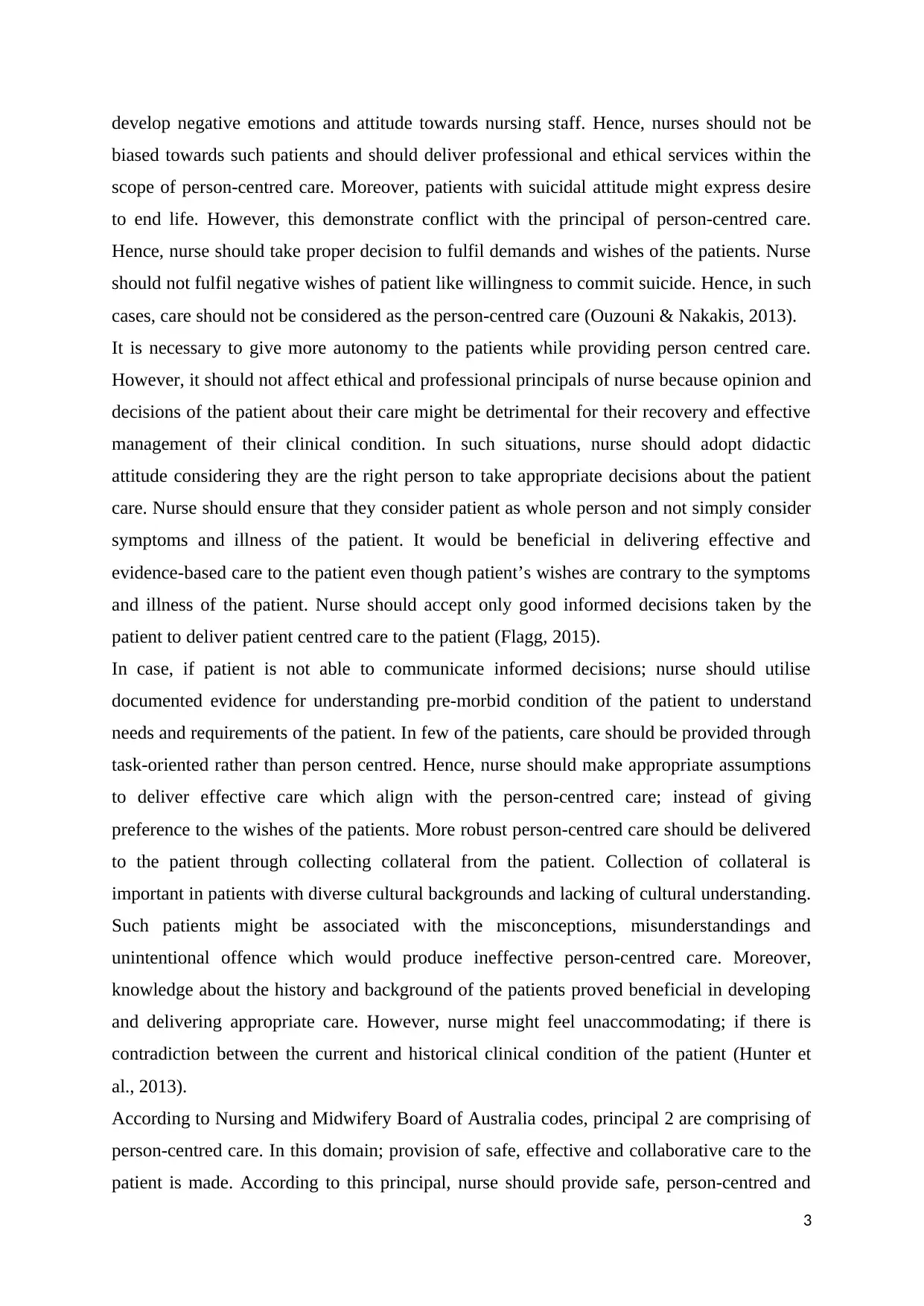
develop negative emotions and attitude towards nursing staff. Hence, nurses should not be
biased towards such patients and should deliver professional and ethical services within the
scope of person-centred care. Moreover, patients with suicidal attitude might express desire
to end life. However, this demonstrate conflict with the principal of person-centred care.
Hence, nurse should take proper decision to fulfil demands and wishes of the patients. Nurse
should not fulfil negative wishes of patient like willingness to commit suicide. Hence, in such
cases, care should not be considered as the person-centred care (Ouzouni & Nakakis, 2013).
It is necessary to give more autonomy to the patients while providing person centred care.
However, it should not affect ethical and professional principals of nurse because opinion and
decisions of the patient about their care might be detrimental for their recovery and effective
management of their clinical condition. In such situations, nurse should adopt didactic
attitude considering they are the right person to take appropriate decisions about the patient
care. Nurse should ensure that they consider patient as whole person and not simply consider
symptoms and illness of the patient. It would be beneficial in delivering effective and
evidence-based care to the patient even though patient’s wishes are contrary to the symptoms
and illness of the patient. Nurse should accept only good informed decisions taken by the
patient to deliver patient centred care to the patient (Flagg, 2015).
In case, if patient is not able to communicate informed decisions; nurse should utilise
documented evidence for understanding pre-morbid condition of the patient to understand
needs and requirements of the patient. In few of the patients, care should be provided through
task-oriented rather than person centred. Hence, nurse should make appropriate assumptions
to deliver effective care which align with the person-centred care; instead of giving
preference to the wishes of the patients. More robust person-centred care should be delivered
to the patient through collecting collateral from the patient. Collection of collateral is
important in patients with diverse cultural backgrounds and lacking of cultural understanding.
Such patients might be associated with the misconceptions, misunderstandings and
unintentional offence which would produce ineffective person-centred care. Moreover,
knowledge about the history and background of the patients proved beneficial in developing
and delivering appropriate care. However, nurse might feel unaccommodating; if there is
contradiction between the current and historical clinical condition of the patient (Hunter et
al., 2013).
According to Nursing and Midwifery Board of Australia codes, principal 2 are comprising of
person-centred care. In this domain; provision of safe, effective and collaborative care to the
patient is made. According to this principal, nurse should provide safe, person-centred and
3
biased towards such patients and should deliver professional and ethical services within the
scope of person-centred care. Moreover, patients with suicidal attitude might express desire
to end life. However, this demonstrate conflict with the principal of person-centred care.
Hence, nurse should take proper decision to fulfil demands and wishes of the patients. Nurse
should not fulfil negative wishes of patient like willingness to commit suicide. Hence, in such
cases, care should not be considered as the person-centred care (Ouzouni & Nakakis, 2013).
It is necessary to give more autonomy to the patients while providing person centred care.
However, it should not affect ethical and professional principals of nurse because opinion and
decisions of the patient about their care might be detrimental for their recovery and effective
management of their clinical condition. In such situations, nurse should adopt didactic
attitude considering they are the right person to take appropriate decisions about the patient
care. Nurse should ensure that they consider patient as whole person and not simply consider
symptoms and illness of the patient. It would be beneficial in delivering effective and
evidence-based care to the patient even though patient’s wishes are contrary to the symptoms
and illness of the patient. Nurse should accept only good informed decisions taken by the
patient to deliver patient centred care to the patient (Flagg, 2015).
In case, if patient is not able to communicate informed decisions; nurse should utilise
documented evidence for understanding pre-morbid condition of the patient to understand
needs and requirements of the patient. In few of the patients, care should be provided through
task-oriented rather than person centred. Hence, nurse should make appropriate assumptions
to deliver effective care which align with the person-centred care; instead of giving
preference to the wishes of the patients. More robust person-centred care should be delivered
to the patient through collecting collateral from the patient. Collection of collateral is
important in patients with diverse cultural backgrounds and lacking of cultural understanding.
Such patients might be associated with the misconceptions, misunderstandings and
unintentional offence which would produce ineffective person-centred care. Moreover,
knowledge about the history and background of the patients proved beneficial in developing
and delivering appropriate care. However, nurse might feel unaccommodating; if there is
contradiction between the current and historical clinical condition of the patient (Hunter et
al., 2013).
According to Nursing and Midwifery Board of Australia codes, principal 2 are comprising of
person-centred care. In this domain; provision of safe, effective and collaborative care to the
patient is made. According to this principal, nurse should provide safe, person-centred and
3
⊘ This is a preview!⊘
Do you want full access?
Subscribe today to unlock all pages.

Trusted by 1+ million students worldwide
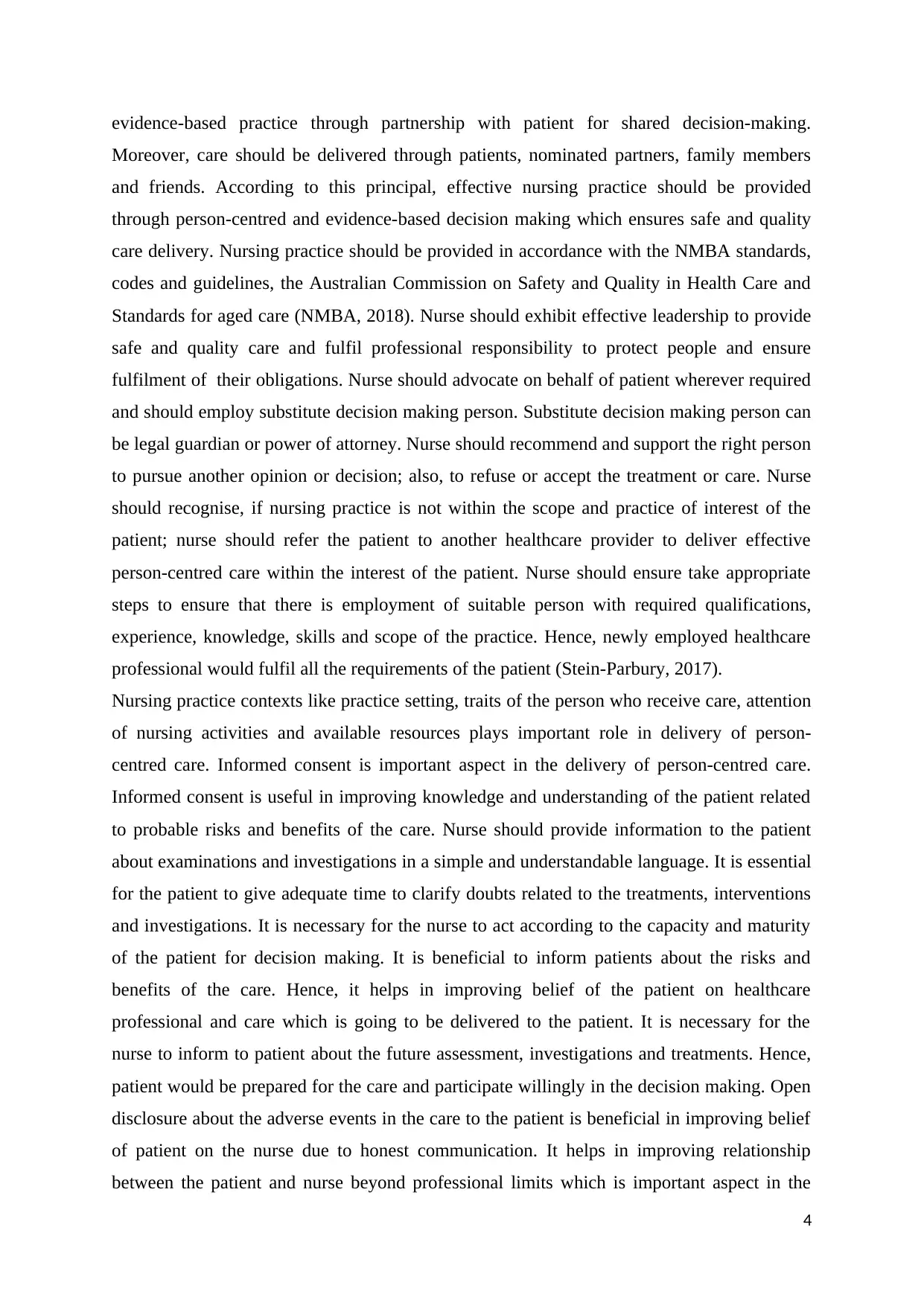
evidence-based practice through partnership with patient for shared decision-making.
Moreover, care should be delivered through patients, nominated partners, family members
and friends. According to this principal, effective nursing practice should be provided
through person-centred and evidence-based decision making which ensures safe and quality
care delivery. Nursing practice should be provided in accordance with the NMBA standards,
codes and guidelines, the Australian Commission on Safety and Quality in Health Care and
Standards for aged care (NMBA, 2018). Nurse should exhibit effective leadership to provide
safe and quality care and fulfil professional responsibility to protect people and ensure
fulfilment of their obligations. Nurse should advocate on behalf of patient wherever required
and should employ substitute decision making person. Substitute decision making person can
be legal guardian or power of attorney. Nurse should recommend and support the right person
to pursue another opinion or decision; also, to refuse or accept the treatment or care. Nurse
should recognise, if nursing practice is not within the scope and practice of interest of the
patient; nurse should refer the patient to another healthcare provider to deliver effective
person-centred care within the interest of the patient. Nurse should ensure take appropriate
steps to ensure that there is employment of suitable person with required qualifications,
experience, knowledge, skills and scope of the practice. Hence, newly employed healthcare
professional would fulfil all the requirements of the patient (Stein-Parbury, 2017).
Nursing practice contexts like practice setting, traits of the person who receive care, attention
of nursing activities and available resources plays important role in delivery of person-
centred care. Informed consent is important aspect in the delivery of person-centred care.
Informed consent is useful in improving knowledge and understanding of the patient related
to probable risks and benefits of the care. Nurse should provide information to the patient
about examinations and investigations in a simple and understandable language. It is essential
for the patient to give adequate time to clarify doubts related to the treatments, interventions
and investigations. It is necessary for the nurse to act according to the capacity and maturity
of the patient for decision making. It is beneficial to inform patients about the risks and
benefits of the care. Hence, it helps in improving belief of the patient on healthcare
professional and care which is going to be delivered to the patient. It is necessary for the
nurse to inform to patient about the future assessment, investigations and treatments. Hence,
patient would be prepared for the care and participate willingly in the decision making. Open
disclosure about the adverse events in the care to the patient is beneficial in improving belief
of patient on the nurse due to honest communication. It helps in improving relationship
between the patient and nurse beyond professional limits which is important aspect in the
4
Moreover, care should be delivered through patients, nominated partners, family members
and friends. According to this principal, effective nursing practice should be provided
through person-centred and evidence-based decision making which ensures safe and quality
care delivery. Nursing practice should be provided in accordance with the NMBA standards,
codes and guidelines, the Australian Commission on Safety and Quality in Health Care and
Standards for aged care (NMBA, 2018). Nurse should exhibit effective leadership to provide
safe and quality care and fulfil professional responsibility to protect people and ensure
fulfilment of their obligations. Nurse should advocate on behalf of patient wherever required
and should employ substitute decision making person. Substitute decision making person can
be legal guardian or power of attorney. Nurse should recommend and support the right person
to pursue another opinion or decision; also, to refuse or accept the treatment or care. Nurse
should recognise, if nursing practice is not within the scope and practice of interest of the
patient; nurse should refer the patient to another healthcare provider to deliver effective
person-centred care within the interest of the patient. Nurse should ensure take appropriate
steps to ensure that there is employment of suitable person with required qualifications,
experience, knowledge, skills and scope of the practice. Hence, newly employed healthcare
professional would fulfil all the requirements of the patient (Stein-Parbury, 2017).
Nursing practice contexts like practice setting, traits of the person who receive care, attention
of nursing activities and available resources plays important role in delivery of person-
centred care. Informed consent is important aspect in the delivery of person-centred care.
Informed consent is useful in improving knowledge and understanding of the patient related
to probable risks and benefits of the care. Nurse should provide information to the patient
about examinations and investigations in a simple and understandable language. It is essential
for the patient to give adequate time to clarify doubts related to the treatments, interventions
and investigations. It is necessary for the nurse to act according to the capacity and maturity
of the patient for decision making. It is beneficial to inform patients about the risks and
benefits of the care. Hence, it helps in improving belief of the patient on healthcare
professional and care which is going to be delivered to the patient. It is necessary for the
nurse to inform to patient about the future assessment, investigations and treatments. Hence,
patient would be prepared for the care and participate willingly in the decision making. Open
disclosure about the adverse events in the care to the patient is beneficial in improving belief
of patient on the nurse due to honest communication. It helps in improving relationship
between the patient and nurse beyond professional limits which is important aspect in the
4
Paraphrase This Document
Need a fresh take? Get an instant paraphrase of this document with our AI Paraphraser
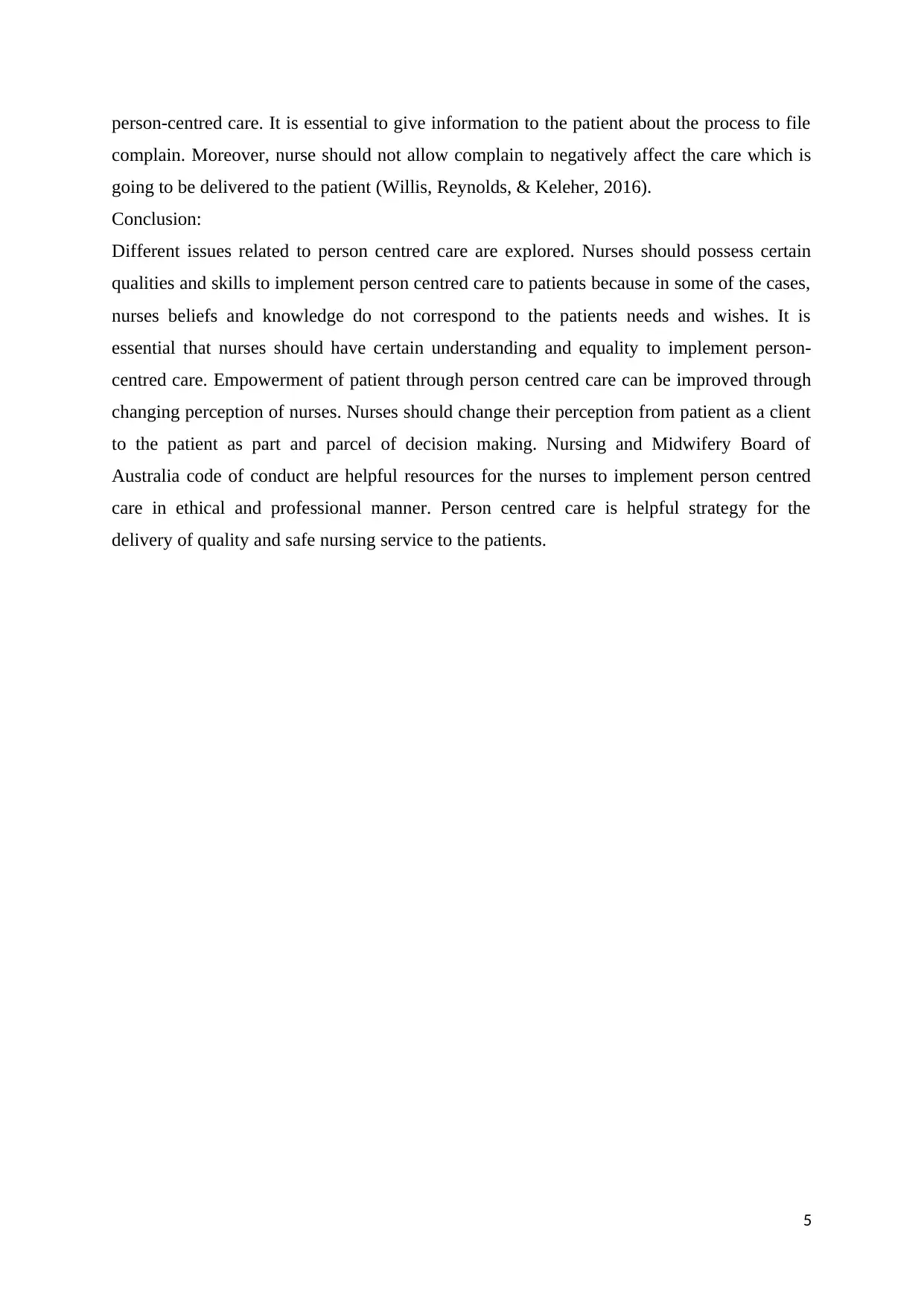
person-centred care. It is essential to give information to the patient about the process to file
complain. Moreover, nurse should not allow complain to negatively affect the care which is
going to be delivered to the patient (Willis, Reynolds, & Keleher, 2016).
Conclusion:
Different issues related to person centred care are explored. Nurses should possess certain
qualities and skills to implement person centred care to patients because in some of the cases,
nurses beliefs and knowledge do not correspond to the patients needs and wishes. It is
essential that nurses should have certain understanding and equality to implement person-
centred care. Empowerment of patient through person centred care can be improved through
changing perception of nurses. Nurses should change their perception from patient as a client
to the patient as part and parcel of decision making. Nursing and Midwifery Board of
Australia code of conduct are helpful resources for the nurses to implement person centred
care in ethical and professional manner. Person centred care is helpful strategy for the
delivery of quality and safe nursing service to the patients.
5
complain. Moreover, nurse should not allow complain to negatively affect the care which is
going to be delivered to the patient (Willis, Reynolds, & Keleher, 2016).
Conclusion:
Different issues related to person centred care are explored. Nurses should possess certain
qualities and skills to implement person centred care to patients because in some of the cases,
nurses beliefs and knowledge do not correspond to the patients needs and wishes. It is
essential that nurses should have certain understanding and equality to implement person-
centred care. Empowerment of patient through person centred care can be improved through
changing perception of nurses. Nurses should change their perception from patient as a client
to the patient as part and parcel of decision making. Nursing and Midwifery Board of
Australia code of conduct are helpful resources for the nurses to implement person centred
care in ethical and professional manner. Person centred care is helpful strategy for the
delivery of quality and safe nursing service to the patients.
5
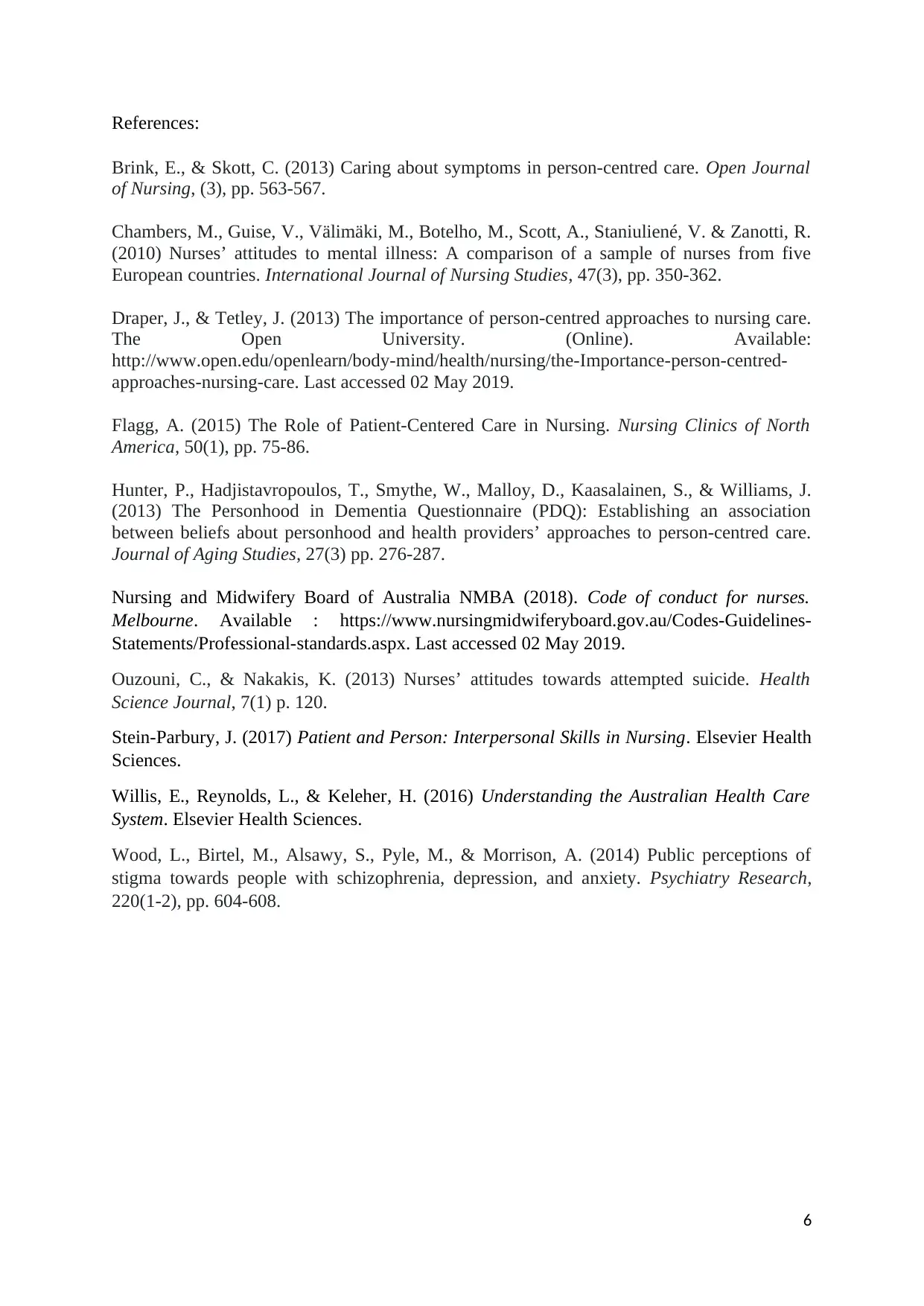
References:
Brink, E., & Skott, C. (2013) Caring about symptoms in person-centred care. Open Journal
of Nursing, (3), pp. 563-567.
Chambers, M., Guise, V., Välimäki, M., Botelho, M., Scott, A., Staniuliené, V. & Zanotti, R.
(2010) Nurses’ attitudes to mental illness: A comparison of a sample of nurses from five
European countries. International Journal of Nursing Studies, 47(3), pp. 350-362.
Draper, J., & Tetley, J. (2013) The importance of person-centred approaches to nursing care.
The Open University. (Online). Available:
http://www.open.edu/openlearn/body-mind/health/nursing/the-Importance-person-centred-
approaches-nursing-care. Last accessed 02 May 2019.
Flagg, A. (2015) The Role of Patient-Centered Care in Nursing. Nursing Clinics of North
America, 50(1), pp. 75-86.
Hunter, P., Hadjistavropoulos, T., Smythe, W., Malloy, D., Kaasalainen, S., & Williams, J.
(2013) The Personhood in Dementia Questionnaire (PDQ): Establishing an association
between beliefs about personhood and health providers’ approaches to person-centred care.
Journal of Aging Studies, 27(3) pp. 276-287.
Nursing and Midwifery Board of Australia NMBA (2018). Code of conduct for nurses.
Melbourne. Available : https://www.nursingmidwiferyboard.gov.au/Codes-Guidelines-
Statements/Professional-standards.aspx. Last accessed 02 May 2019.
Ouzouni, C., & Nakakis, K. (2013) Nurses’ attitudes towards attempted suicide. Health
Science Journal, 7(1) p. 120.
Stein-Parbury, J. (2017) Patient and Person: Interpersonal Skills in Nursing. Elsevier Health
Sciences.
Willis, E., Reynolds, L., & Keleher, H. (2016) Understanding the Australian Health Care
System. Elsevier Health Sciences.
Wood, L., Birtel, M., Alsawy, S., Pyle, M., & Morrison, A. (2014) Public perceptions of
stigma towards people with schizophrenia, depression, and anxiety. Psychiatry Research,
220(1-2), pp. 604-608.
6
Brink, E., & Skott, C. (2013) Caring about symptoms in person-centred care. Open Journal
of Nursing, (3), pp. 563-567.
Chambers, M., Guise, V., Välimäki, M., Botelho, M., Scott, A., Staniuliené, V. & Zanotti, R.
(2010) Nurses’ attitudes to mental illness: A comparison of a sample of nurses from five
European countries. International Journal of Nursing Studies, 47(3), pp. 350-362.
Draper, J., & Tetley, J. (2013) The importance of person-centred approaches to nursing care.
The Open University. (Online). Available:
http://www.open.edu/openlearn/body-mind/health/nursing/the-Importance-person-centred-
approaches-nursing-care. Last accessed 02 May 2019.
Flagg, A. (2015) The Role of Patient-Centered Care in Nursing. Nursing Clinics of North
America, 50(1), pp. 75-86.
Hunter, P., Hadjistavropoulos, T., Smythe, W., Malloy, D., Kaasalainen, S., & Williams, J.
(2013) The Personhood in Dementia Questionnaire (PDQ): Establishing an association
between beliefs about personhood and health providers’ approaches to person-centred care.
Journal of Aging Studies, 27(3) pp. 276-287.
Nursing and Midwifery Board of Australia NMBA (2018). Code of conduct for nurses.
Melbourne. Available : https://www.nursingmidwiferyboard.gov.au/Codes-Guidelines-
Statements/Professional-standards.aspx. Last accessed 02 May 2019.
Ouzouni, C., & Nakakis, K. (2013) Nurses’ attitudes towards attempted suicide. Health
Science Journal, 7(1) p. 120.
Stein-Parbury, J. (2017) Patient and Person: Interpersonal Skills in Nursing. Elsevier Health
Sciences.
Willis, E., Reynolds, L., & Keleher, H. (2016) Understanding the Australian Health Care
System. Elsevier Health Sciences.
Wood, L., Birtel, M., Alsawy, S., Pyle, M., & Morrison, A. (2014) Public perceptions of
stigma towards people with schizophrenia, depression, and anxiety. Psychiatry Research,
220(1-2), pp. 604-608.
6
⊘ This is a preview!⊘
Do you want full access?
Subscribe today to unlock all pages.

Trusted by 1+ million students worldwide
1 out of 6
Related Documents
Your All-in-One AI-Powered Toolkit for Academic Success.
+13062052269
info@desklib.com
Available 24*7 on WhatsApp / Email
![[object Object]](/_next/static/media/star-bottom.7253800d.svg)
Unlock your academic potential
Copyright © 2020–2026 A2Z Services. All Rights Reserved. Developed and managed by ZUCOL.





